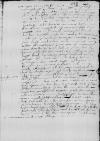Aus E(wer) H(erlichkei)t freuntlich ⌊⌋, dat(um) ⌊Swiecze⌋ den donnerstag noch s(ancti) Thomae[1], / das wir disses monts den XIII tag entfang(en), / hab wir gern(n) vornomen(n), / wie E(wer) H(erlichkei)t die sache mit dem(m) loblichen(n) adel des orts von weg(en) des h(e)rn ⌊underkanczlers⌋ / angestelt. / Ist uns ouch fast lieb gewest, / das E(wer) H(erlichkei)t unser(r) vortraulich schreiben(n) des h(e)rn ⌊danczker castellan⌋ / und E(wer) H(erlichkei)t ⌊sons⌋ halbn(n) nicht ist zu widren(n) gewesen(n), / welchs in worheit nicht anders dan gutter(r) meynung und in alter freuntlicher(r) zuversicht ist ausgang(en). Wir woltn(n) io gern(n), / das es E(wer) H(erlichkei)t und den(n) iren(n) allenhalben(n) wol und richtig in aller(r) ⌊disser lande einwoner⌋ gunst zustunde und erginge / etc. Das aber E(wer) H(erlichkei)t begert von(n) uns zu wissen, / die weil unser g(nedig)ste fraw die ⌊konigin⌋ ir m(ajeste)t uns befholen(n), Ew(e)r H(erlichkei)t text damaged⌈[H(erlichkei)t]H(erlichkei)t text damaged⌉ szone nicht abzusthen(n), / ab die sache widerum(m)b hie ins ⌊land⌋ vorwisen(n), / ist nicht gescheen(n). / Das koniglich decret on the margin in place of crossed-out Sunst⌈Sunst Das koniglich decret Das koniglich decret on the margin in place of crossed-out Sunst⌉ aber(r) bringt mit, / so sich imant besvert furdert, der muge superinscribed⌈der mugeder muge superinscribed⌉ in gemeiner(r) des ⌊Reichs⌋ ⌊tagfart⌋ / weiter anzuhalten(n), / das nicht wirt nochbleibn(n). Es werd(en) ouch hyrinne[2] die h(e)rn ⌊land und written over s⌈sdd written over s⌉ stethe⌋ zu thun haben(n), / nemlich so es die kleinen(n) steth alle ... illegible⌈...... illegible⌉, ouch das gancze ⌊land⌋ angeth, / solde die ⌊Weissel⌋ idermeniglich frey sein, / ausgeslossen die vom ⌊Sthum⌋. / Wer mochte solchs billigen / oder superinscribed in place of crossed-out und⌈und oder oder superinscribed in place of crossed-out und⌉ recht achten(n). Dis hab wir in alter zcwischen uns erwachsner freuntlicheit trewhercziger(r) meynung / E(wer) H(erlichkei)t, / die wir durch dissen edlen unsernn superinscribed in place of crossed-out uns⌈uns unsern(n) unsernn superinscribed in place of crossed-out uns⌉ libn(n), besondren(n) ⌊Niklos Plotowsky⌋ thun besuchen, / und der vil glukseliger(r) zceit mit al den iren(n) wunschen(n), / nicht mug(en) zu antwurtte on the margin⌈zu antwurttezu antwurtte on the margin⌉ verhaltn(n).

 BCz, 245, p. 239
BCz, 245, p. 239